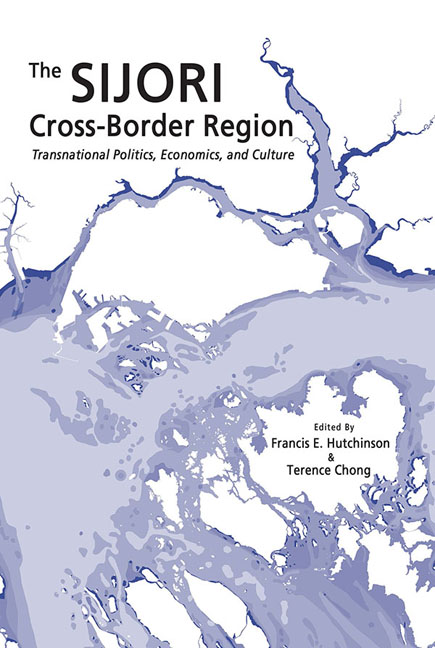Book contents
- Frontmatter
- Contents
- List of Maps
- List of Tables
- List of Figures
- Foreword
- Acknowledgements
- Contributors
- Abbreviations
- Introduction
- Section I Understanding the Whole
- Section II Policy and Politics
- Map3
- 4 The Social Construction of Comparative Advantage and the SIJORI Growth Triangle
- 5 The Political Economy of Closer Relations: A Perspective from Singapore
- 6 A Periphery Serving Three Cores: Balancing Local, National, and Cross-Border Interests in the Riau Islands
- 7 Political Contestation in Iskandar Malaysia: Views on Economic Integration during Malaysia's 13th General Election
- 8 Johor Survey: Interethnic Dissonance
- Section III Cross-Border Social and Cultural Communities
- Section IV Formal and Informal Economies
- Conclusion
- Appendix
- Sources for the SIJORI Maps
- Index
8 - Johor Survey: Interethnic Dissonance
from Section II - Policy and Politics
Published online by Cambridge University Press: 22 July 2017
- Frontmatter
- Contents
- List of Maps
- List of Tables
- List of Figures
- Foreword
- Acknowledgements
- Contributors
- Abbreviations
- Introduction
- Section I Understanding the Whole
- Section II Policy and Politics
- Map3
- 4 The Social Construction of Comparative Advantage and the SIJORI Growth Triangle
- 5 The Political Economy of Closer Relations: A Perspective from Singapore
- 6 A Periphery Serving Three Cores: Balancing Local, National, and Cross-Border Interests in the Riau Islands
- 7 Political Contestation in Iskandar Malaysia: Views on Economic Integration during Malaysia's 13th General Election
- 8 Johor Survey: Interethnic Dissonance
- Section III Cross-Border Social and Cultural Communities
- Section IV Formal and Informal Economies
- Conclusion
- Appendix
- Sources for the SIJORI Maps
- Index
Summary
INTRODUCTION
The state of Johor is in transition. On the political front, one of the striking trends of Malaysia's 2013 General Elections was that over 81 per cent of the Chinese vote went to the opposition. This loss of Chinese votes was quickly dubbed the “Chinese tsunami” by the ruling coalition, the Barisan Nasional (BN). This label proved erroneous because the BN actually received a lower share of the vote from Malay and Indian voters as well (Izwan 2013). According to studies elsewhere, the Chinese vote in the state of Johor dipped from 52.7 per cent in 2008 for the BN to 21.3 per cent in 2013 while the Malay vote for the BN in the state saw a slight increase from 81.1 per cent in 2008 to 81.9 per cent in 2013 (Merdeka Center 2013). Among the host of electoral issues were rising property prices (Hong 2012), corruption and transparency in government (Low and Green 2013), as well as a clean-up of the electoral roll (Merdeka Center 2012). Meanwhile the BN's loss of support from urban voters was attributed to the three “Cs”, namely, “corruption, cost of living, and crime” (Jayasankaran 2013).
Johor also has economic aspirations. Iskandar Malaysia was established on 30 July 2006 as an economic development zone in the state with longer term plans for it to be a hub for finance and business, medicine and education, as well as a site for luxury private housing, and electronic and industrial facilities. In total, Iskandar Malaysia covers an area of over 2,000 square kilometres. Some eight years after its establishment, Iskandar Malaysia has attracted a total of S$51 billion in investments (Channel NewsAsia 2014). According to official Malaysian statistics, Singapore is by far the lead investor to date with RM9.1 billion, followed by Spain at RM4.1 billion, and in third place Japan at RM3.7 billion. It has, however, not always been smooth sailing. The Iskandar Regional Development Authority (IRDA) has admitted that it needs to win over the “hearts and minds” of Johor residents, as well as “be more attuned to the needs of local residents” and to “counter the perception that Iskandar Malaysia only served the interests of foreign investors” (New Straits Times 2009). More recently, IRDA has had to refute claims that the inflow of foreign investments into Iskandar Malaysia has “marginalized Malays in Johor” (Teo 2013).
- Type
- Chapter
- Information
- The SIJORI Cross-Border RegionTransnational Politics, Economics, and Culture, pp. 207 - 228Publisher: ISEAS–Yusof Ishak InstitutePrint publication year: 2016



